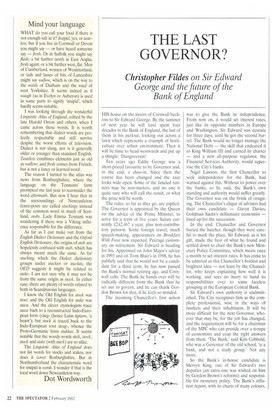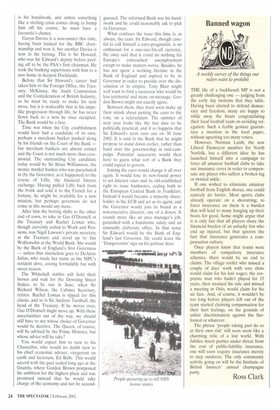THE LAST GOVERNOR?
Christopher Fildes on Sir Edward
George and the future of the Bank of England
HIS house on the moors of Cornwall beckons to Sir Edward George. By the summer of next year he will have spent four decades in the Bank of England, the last of them in his parlour, looking out across a lawn which represents a triumph of horticulture over urban environment. Then it will be time to head westwards and put up a shingle: `Dungovernitf Ten years ago Eddie George was a short-priced favourite to be Governor and, in the end, a shoo-in. Since then the course has been changed and the race looks wide open. Some of the fancied runners may be non-starters, and no one is quite sure who will call the result, or what the prize will be worth.
The rules, so far as they go, are explicit. The Governor is appointed by the Queen on the advice of the Prime Minister, to serve for a term of five years. Salary currently £242,467 a year, plus non-contributory pension. Some foreign travel, much speech-making, appearances on Breakfast With Frost now expected. Peerage customary on retirement. Sir Edward is heading for his. Appointed on John Major's advice in 1993 and on Tony Blair's in 1998, he has publicly said that he would not be a candidate for a third term, he has now passed the Bank's normal retiring age, and Cornwall calls. The Bank he hands over will be radically different from the Bank that he set out to govern, and he can thank Gordon Brown for that, if he feels so minded.
The incoming Chancellor's first action was to give the Bank its independence, From now on, it would set interest rates, just like its opposite numbers in Europe and Washington. Sir Edward was ecstatic for three days, until he got the second barrel. The Bank would no longer manage the National Debt — the skill that endeared it to King William III and earned its charter — and a new all-purpose regulator, the Financial Services Authority, would supervise the City's banks.
Nigel Lawson, the first Chancellor to seek independence for the Bank, had warned against this. Without its power over the banks, so he said, the Bank's own standing and authority would suffer greatly. The Governor was on the brink of resigning. The Chancellor's clique of advisers had their own candidate — Gavyn Davies, Goldman Sachs's millionaire economist — lined up for the succession.
In the end. Chancellor and Governor buried the hatchet, though they were careful to mark the place. Sir Edward, as is his gift, made the best of what he found and settled down to chair the Bank's new Monetary Policy Committee, which meets once a month to set interest rates. It has come to be admired as this Chancellor's boldest and brightest idea — not least by the Chancellor, who keeps explaining how well it is working, and sees no hurry to hand its responsibilities over to some faceless grouping at the European Central Bank, Sir Edward's own authority is undiminished. The City recognises him as the complete professional, wise in the ways of markets and their inhabitants. It will be more difficult for the next Governor, whoever that may be, for the job has changed, and the requirement will be for a chairman of the MPC who can preside over a troupe of economists and coax the right answers from them. 'The Bank,' said Kim Cobbold, who was a Governor of the old school, 'is a bank, and not a study group.' Not any more.
So the Bank's in-house candidate is Mervyn King, one of Sir Edward's two deputies (an extra one was wished on him by Gordon Brown's reforms) and responsible for monetary policy. The Bank's inflation report, with its charts of many colours, is his handiwork, and unless something like a sterling crisis comes along to bump him off his course, he must have a favourite's chance.
Gmyn Davies is a non-runner this time, having been trained for the BBC chairmanship and won it, but another Davies is now in the betting. This is Sir Howard, who was Sir Edward's deputy before peeling off to be the FSA's first chairman. He took the banking supervisors with him to a new home in deepest Docklands.
Before that Sir Howard's career had taken him to the Foreign Office, the Treasury, McKinsey, the Audit Commission and the Confederation of British Industry, so he must be ready to make his next move, but it is noticeable that in his snipelike progression through life, he has never flown back to a nest he once occupied. The Bank would be a first.
Time was when the City establishment would have had a candidate of its own, perhaps a merchant banker pushed along by his friends on the Court of the Bank — but merchant bankers are almost extinct and the Court is not much more than ceremonial. The outstanding City candidate today would be Sir Brian Williamson, the money market banker who was parachuted in (by the Governor, as it happened) to the rescue of Liffe, the financial futures exchange. Having pulled Life back from the brink and sold it to the French for a fortune, he might be available for a new mission, but perhaps governors do not come in this mould any more, After him the betting shifts to the other end of town, to take in Gus O'Donnell at the Treasury and Rachel Lomax who, though currently exiled to Work and Pensions, was Nigel Lawson's private secretary at the Treasury and stood up to Jim Wolfensohn at the World Bank. She would be the Bank of England's first Governess — unless that distinction goes to DeAnne Julius, who made her name as the MPC's resident dove, cooing formidably but with sweet reason.
The Whitehall stables will hold their horses and wait for the Downing Street Stakes, to be run in June, when Sir Richard Wilson, the Cabinet Secretary, retires. Rachel Lomax is tipped for this classic, and so is Sir Andrew Turnbull, the head of the Treasury. If he moves over, Gus O'Donnell might move up. With these uncertainties out of the way, we should still have to see whose choice of Governor would be decisive. The Queen, of course, will be advised by the Prime Minister, but whose advice will he take?
You would expect him to turn to his Chancellor, who would no doubt turn to his chief economic adviser, vicegerent on earth and factotum, Ed Balls. This would accord with the pact sealed long ago at the Granita, where Gordon Brown postponed his ambition for the highest place and was promised instead that he would take charge of the economy and not be second
guessed. The reformed Bank was his handiwork and he could reasonably ask to pick its Governor.
What confuses the issue this time is, as always, the euro. Sir Edward, though careful to call himself a euro-pragmatist, is no enthusiast for a one-size-fits-all currency. He once said that it could do nothing for Europe's entrenched unemployment except to make matters worse. Besides, he has not spent a working lifetime in the Bank of England and aspired to be its Governor in order to preside over the dissolution of its empire. Tony Blair might well want to find a successor who would be less territorial and more on-message. Gordon Brown might not exactly agree.
Between them, they must soon make up their minds about putting the euro to the vote, on a referendum. The summer of next year looks like the last date to be politically practical, and it so happens that Sir Edward's term runs out on 30 June 2003. It is said in the Bank that he might propose to stand down earlier, rather than hand over the governorship in mid-campaign. Potential successors would then have to guess what sort of a Bank they could expect to govern.
Joining the euro would change it all over again. It would lose its new-found power to set interest rates and its old-established right to issue banknotes, ceding both to the European Central Bank in Frankfurt. Instead it would become a minority shareholder in the ECB and act as its agent, and the Governor would join its board as a non-executive director, one of a dozen. It sounds more like an area manager's job, garnished with a handsome salary and an unusually elaborate office. In that sense Sir Edward would be the Bank of England's last Governor. He could leave the `Dungovernin' sign on his parlour door.































































 Previous page
Previous page